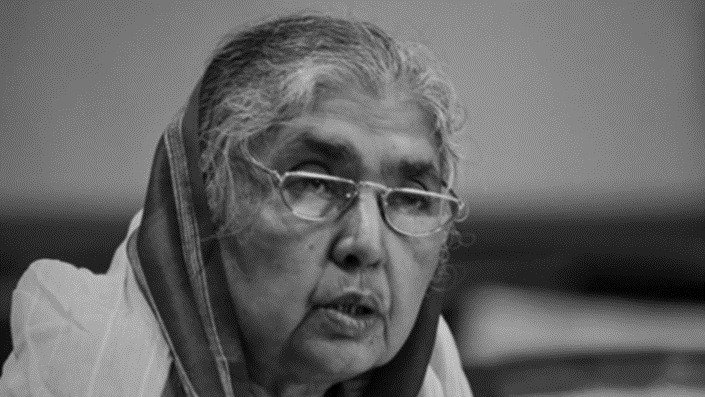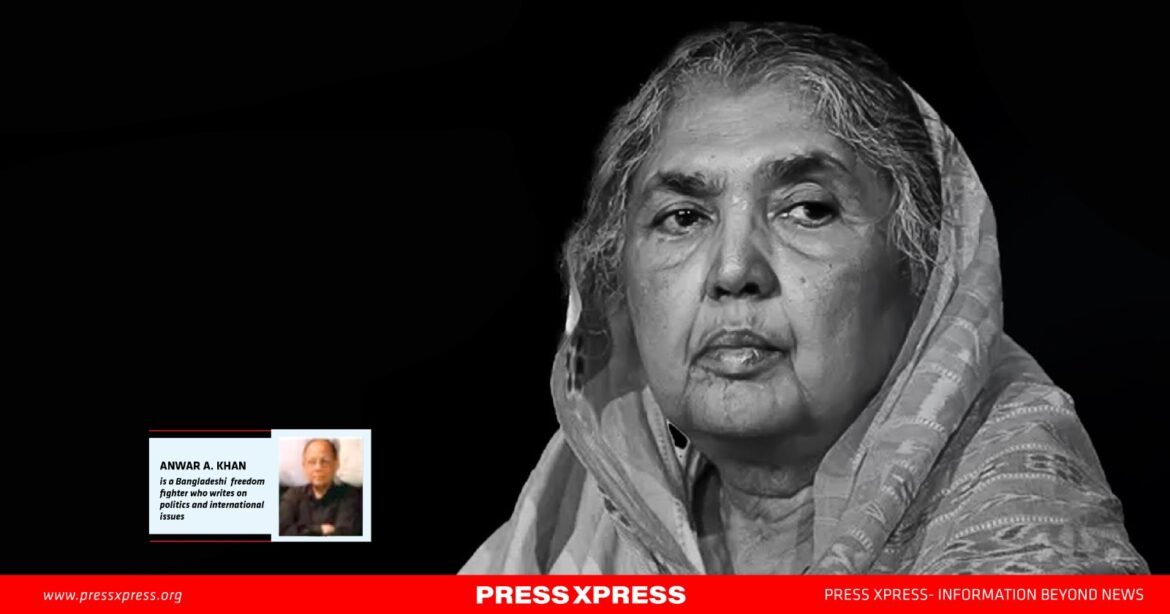Gone from our sights, but never from our hearts!
Since 1966, I have heard countless fiery, patriotic, and inspiring speeches from the revered Matia Chowdhury at public meetings.
As a prominent student leader and later as a member of the Awami League presidium, Matia Chowdhury was always on the frontlines, fighting for the just causes of the Bangladeshi people. Even as an octogenarian, she remained a vocal advocate against all forms of oppression until her passing on October 16, 2024, at the age of 82.
Today’s women leaders must be resolute in following her courageous example. We must not rest until the inherent value of every individual is recognized, and all forms of oppression are defeated. Matia Chowdhury stands as one of the most outstanding women political leaders in Bangladesh’s history. In this crucial time for our nation, her presence would have been invaluable, but sadly, we lost her on October 16, 2024.

Throughout her student life, Matia Chowdhury was a fierce orator against the oppressive rule of the Pakistani regime, earning her the revered title of “Ogni Konnya” or the “Girl of Fire.” She became the sole woman commander-in-chief in the eastern hemisphere and the first to ascend to such a position solely on her own merits. In a society with a reputation for machismo, Matia’s rise might seem like a groundbreaking power shift. However, while it may be remarkable in numbers, feminists may find less cause for celebration upon closer examination.
Matia embodies the principle Warren G. Bennis once described: “Leadership is the capacity to transform vision into reality.” Women were not merely spectators during Bangladesh’s struggle for independence. Many actively engaged in political issues and joined the movement, contributing on various levels. Women like Amena Begum and Matia Chowdhury stood shoulder to shoulder with male leaders, playing crucial roles in fighting the tyrannical Pakistani regime.
When women take on such significant political roles, it signals that the revolution has entered a new phase. The unparalleled courage demonstrated by Bangladeshi women in the 1950s, 1960s, and 1970s propelled the liberation movement to its pivotal victory in 1971. Women leaders were at the forefront of political struggles in the decades leading to independence, leading campaigns that confronted their specific forms of oppression. Thousands of women participated in massive rallies, processions, and demonstrations across East Pakistan in 1969 and early 1971, opposing the injustices of the Pakistani rulers.
Despite all the hardships, Matia Chowdhury remained steadfast in her belief in the eventual triumph of Bangladesh and its people in their struggle for freedom and dignity, both in 1971 and beyond. She stands as a defiant example of a Bangladeshi woman leader who refused to accept a subordinate role in any form. Her legacy remains alive among her followers, and she is best remembered as a leading figure for women’s rights. Throughout her life, Matia Chowdhury was one of Bangladesh’s bravest fighters, an unwavering opponent of any form of subjugation.
Matia Chowdhury, widely known as ‘Agni-kannaya’ (the Daughter of Fire), is a former Agriculture Minister and Deputy Leader of the Parliament in the Government of the People’s Republic of Bangladesh. Born on June 30, 1942, Matia began her political journey as a student, taking an active role in movements against Pakistan’s Ayub regime and the 1962 Education Commission. Her leadership skills were recognized early, as she was elected Vice-President of Dhaka Eden Girls College Students’ Union in 1963, and later General Secretary of Dhaka University Central Students’ Union (DUCSU) in 1964-65. During her time at Dhaka University, Matia emerged as an exceptional student leader, gaining the title ‘Agni-kannaya’ for her fiery speeches and leadership. In 1965-66, she served as President of the East Pakistan Students’ Union.
Matia’s involvement in politics only deepened, as she organized protests against Ayub’s regime from 1967 to 1969, during which she was jailed for nearly two years. Following her release in 1969, she played a crucial role in Bangladesh’s independence struggle in 1971. After the assassination of Bangabandhu Sheikh Mujibur Rahman on August 15, 1975, Matia took a strong stand against the military junta, leading a procession from Dhaka University to Bangabandhu Bhaban to honor the fallen leader and resist the usurpers.
In the post-independence era, Matia became the Organizing Secretary of the National Awami Party before joining the Awami League in 1979, where she has been a presidium member since 1980. She was a key figure in anti-Zia movements from 1976 to 1981 and was imprisoned several times for her activism. Matia also played a pivotal role in the anti-Ershad movement from 1983 to 1990, facing eight detentions in the process.
In 1991, Matia was elected Member of Parliament from Sherpur (Nakla-Nalitabari) on the Awami League ticket and became a symbol of protest during political movements. Her resistance to the caretaker government’s minus-two formula in 2007, led by Fakhuddin Ahmed, further cemented her reputation as a fierce defender of democracy. In the 1996 general elections, she was re-elected to Parliament and appointed a Cabinet Minister, overseeing the Ministries of Agriculture, Food, and Disaster Management & Relief.
Matia continued her political journey, returning to the streets to oppose the four-party alliance government between 2001 and 2006. In the December 2008 elections, she was elected to Parliament for the third time and was again sworn in as Agriculture Minister in January 2009.
Renowned for her unwavering commitment to the welfare of Bangladesh, Matia Chowdhury’s connection with grassroots people and her relentless fight for the nation’s progress has earned her widespread respect. She is hailed as one of Bangladesh’s most honorable politicians, a beacon of integrity, and a leader whose legacy continues to inspire.
A beautiful soul is never forgotten. Rest in peace, your memory will forever be a light in our hearts.


